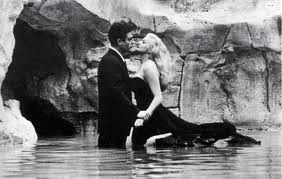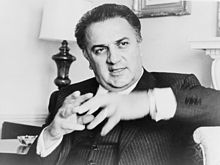La Dolce Vita (film): Difference between revisions
Jackie Sider (talk | contribs) No edit summary |
Jackie Sider (talk | contribs) No edit summary |
||
| (One intermediate revision by the same user not shown) | |||
| Line 39: | Line 39: | ||
[[Category:For review]] | [[Category:For review]] | ||
{{DISPLAYTITLE:<span style="font-style: italic;">La Dolce Vita</span>}} | {{DISPLAYTITLE:<span style="font-style: italic;">La Dolce Vita</span> (film)}} | ||
__NOTOC__ | __NOTOC__ | ||
Latest revision as of 21:40, 24 February 2012
Date: 1959
Region: Europe
Subject: Religious
Medium: Film Video
Artist: Federico Fellini (1920 - 1993)
Confronting Bodies: The Roman Catholic Church; The right wing of the Italian parliament
Date of Action: 1959
Location: Italy
Description of Artwork: La Dolce Vita was the movie that turned Federico Fellini into a international star. When it was first released in Rome it was called a masterpiece. The film was not openly anti-religious or anti-Catholic but there were many instances of promiscuity and casual sex. The only marriage in the film ends when the husband commits suicide and kills his two children.
The Incident: When the movie premiered in August of 1959 there were twenty minutes of applause at the end. When it was shown in Milan, however, there were protests during the movie and one of the audience members spit on Fellini as he left the theater. In the 24 hours after that Fellini got 400 telegrams accusing him of atheism, communism, and treason. At first some people in the Catholic Church actually supported the film. The Church hierarchy did not approve of the film and Cardinal Giuseppe Siri refused to give the film his seal of approval and classified it as unsuitable for all. This classification meant watching the film was a sin, and any clergy that spoke out in favor of the film was threatened with demotion. Many members of the Catholic Church wrote articles saying the movie lacked Christian values and one person even titled the film "The Disgusting Life". At the Chamber of Deputies the far right forced a debate on the movie. They called for the film to be withdrawn from all national circuits but the government refused, saying they did not have the power of censorship.
Results of Incident: The film was still wildly successful despite the opposition. The film was also an international success and won two Oscars. In some countries the movie was only shown after years of suppression. In Madrid it did not premiere until 1981 and was banned in the Soviet Union.
Source: Censorship: A World Encyclopedia

